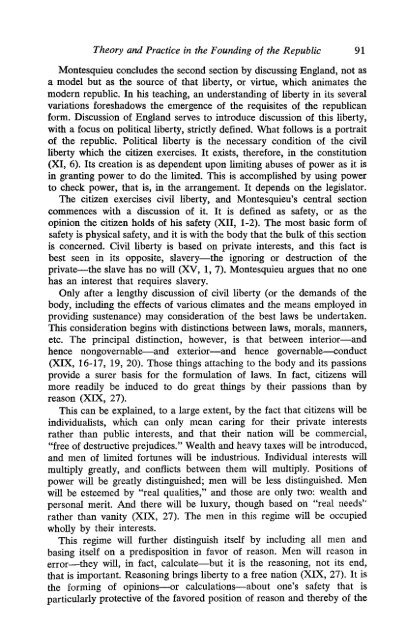philosophy - Interpretation
philosophy - Interpretation
philosophy - Interpretation
You also want an ePaper? Increase the reach of your titles
YUMPU automatically turns print PDFs into web optimized ePapers that Google loves.
needs"<br />
Theory and Practice in the Founding of the Republic 91<br />
Montesquieu concludes the second section<br />
by discussing England,<br />
not as<br />
a model but as the source of that hberty, or virtue, which animates the<br />
modern republic. In his teaching, an understanding of hberty in its several<br />
variations foreshadows the emergence of the requisites of the republican<br />
form. Discussion of England serves to introduce discussion of this liberty,<br />
with a focus on pohtical liberty, strictly defined. What foUows is a portrait<br />
of the repubhc. Pohtical liberty is the necessary<br />
condition of the civU<br />
hberty which the citizen exercises. It exists, therefore, in the constitution<br />
(XI, 6). Its creation is as dependent upon limiting<br />
abuses of power as it is<br />
in granting power to do the hmited. This is accomplished<br />
by using power<br />
to check power, that is, in the arrangement. It depends on the legislator.<br />
The citizen exercises civU hberty, and Montesquieu's central section<br />
commences with a discussion of it. It is defined as safety, or as the<br />
opinion the citizen holds of his safety (XII, 1-2). The most basic form of<br />
safety is physical safety, and it is with the body that the bulk of this section<br />
is concerned. CivU hberty is based on private interests, and this fact is<br />
best seen in its opposite, slavery<br />
private<br />
the ignoring<br />
or destruction of the<br />
the slave has no wUl (XV, 1, 7). Montesquieu argues that no one<br />
has an interest that requires slavery.<br />
Only after a lengthy discussion of civU liberty<br />
body, including<br />
(or the demands of the<br />
the effects of various climates and the means employed in<br />
providing sustenance) may consideration of the best laws be undertaken.<br />
This consideration begins with distinctions between laws, morals, manners,<br />
etc. The principal distinction, however, is that between interior<br />
hence nongovernable and exterior and hence governable conduct<br />
(XIX, 16-17, 19, 20). Those things attaching to the body<br />
and<br />
and its passions<br />
provide a surer basis for the formulation of laws. In fact, citizens wUl<br />
more readUy be induced to do great things by their passions than by<br />
reason (XIX, 27).<br />
This can be explained, to a large extent, by the fact that citizens wiU be<br />
for their private interests<br />
individualists, which can only mean caring<br />
rather than public interests, and that their nation wiU be commercial,<br />
prejudices."<br />
"free of destructive<br />
Wealth and heavy taxes wiU be introduced,<br />
and men of limited fortunes wUl be industrious. Individual interests wUl<br />
multiply greatly, and conflicts between them wiU multiply. Positions of<br />
power wiU be greatly distinguished; men wiU be less distinguished. Men<br />
qualities,"<br />
wiU be esteemed by "real and those are only two: wealth and<br />
personal merit. And there wUl be luxury, though based on "real<br />
rather than vanity (XIX, 27). The men in this regime wiU be occupied<br />
whoUy by their interests.<br />
This regime wUl further distinguish itself all<br />
by including<br />
men and<br />
itself on a predisposition in favor of reason. Men wiU reason in<br />
basing<br />
error they wiU, in fact, calculate but it is the reasoning, not its end,<br />
that is important. Reasoning brings hberty to a free nation (XIX, 27). It is<br />
the forming of opinions or calculations about one's safety that is<br />
particularly protective of the favored position of reason and thereby of the
















